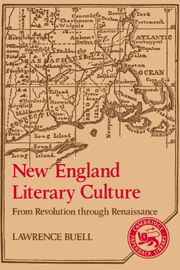Book contents
- Frontmatter
- Contents
- Acknowledgments
- Abbreviations of Frequently Cited Works
- PART I FOUR OVERVIEWS
- PART II THREE REPRESENTATIVE GENRES
- PART III REINVENTING PURITANISM: THE NEW ENGLAND HISTORICAL IMAGINATION
- Part IV NEW ENGLAND AS A COUNTRY OF THE IMAGINATION: THE SPIRIT OF PLACE
- 12 The Cultural Landscape in Regional Poetry and Prose
- 13 The Village as Icon
- 14 Lococentrism from Dwight to Thoreau
- 15 Comic Grotesque
- 16 Provincial Gothic: Hawthorne, Stoddard, and Others
- Postscript
- Appendix Vital Statistics: A Quantitative Analysis of Authorship as a Profession in New England
- Notes
- Index
14 - Lococentrism from Dwight to Thoreau
Published online by Cambridge University Press: 15 October 2009
- Frontmatter
- Contents
- Acknowledgments
- Abbreviations of Frequently Cited Works
- PART I FOUR OVERVIEWS
- PART II THREE REPRESENTATIVE GENRES
- PART III REINVENTING PURITANISM: THE NEW ENGLAND HISTORICAL IMAGINATION
- Part IV NEW ENGLAND AS A COUNTRY OF THE IMAGINATION: THE SPIRIT OF PLACE
- 12 The Cultural Landscape in Regional Poetry and Prose
- 13 The Village as Icon
- 14 Lococentrism from Dwight to Thoreau
- 15 Comic Grotesque
- 16 Provincial Gothic: Hawthorne, Stoddard, and Others
- Postscript
- Appendix Vital Statistics: A Quantitative Analysis of Authorship as a Profession in New England
- Notes
- Index
Summary
What are the rivers around Damascus to this river sleeping around Concord? Are not the Musketaquid and the Assabet, rivers of Concord, fairer than the rivers of the plain?
Henry David Thoreau, Journal (1853)I believe that some of our New England villages within thirty miles of Boston are as boorish and barbarous communities as there are on the face of the earth.
Henry David Thoreau, Journal (1851)The most extensive literary accounts of the New England landscape produced during our period were those of Timothy Dwight and Henry Thoreau. Dwight's poem Greenfield Hill celebrates his parish as the prototypical New England town; his posthumously published Travels in New-England and New-York (4 vols., 1821–2) moves from microcosm to macrocosm, recording some eighteen thousand miles of vacation journeys and semisystematic background reading undertaken over a twentyyear period (1796–1815) when Dwight was president of Yale. Thoreau's even more prolific contribution consists, in addition to his multivolume Journal, of five more specialized books of travels both literal and metaphorical, as well as sundry essays on excursions and natural-history topics.
The apparent irreconcilability of their visions of New England makes Dwight and Thoreau an especially interesting pair. If Dwight has a unifying theme in his Travels, that theme is the nobility and soundness of the beliefs and institutions established by the Puritan saints and bequeathed to their progeny with minor modifications.
- Type
- Chapter
- Information
- New England Literary CultureFrom Revolution through Renaissance, pp. 319 - 334Publisher: Cambridge University PressPrint publication year: 1986



